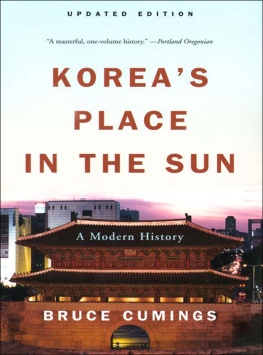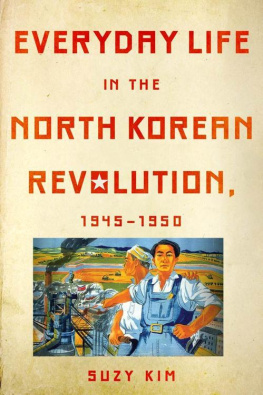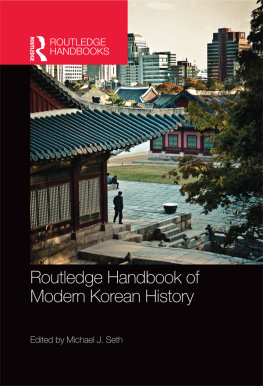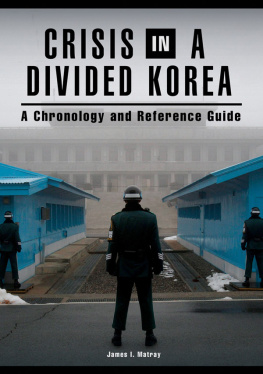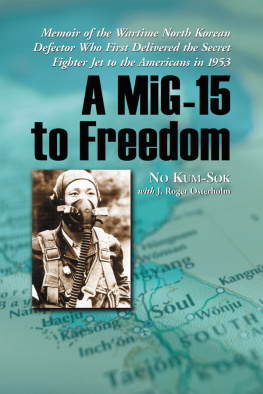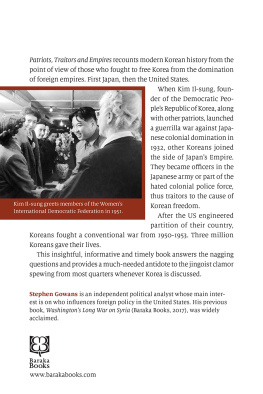ALSO BY BRUCE CUMINGS
The Origins of the Korean War
Volume 1: Liberation and the Emergence
of Separate Regimes, 19451947
Volume 2: The Roaring of the Cataract,
19471950
War and Television

One might trace the history of the limits, of those obscure actions, necessarily forgotten as soon as they are performed, whereby a civilization casts aside something it regards as alien. Throughout its history, this moat which it digs around itself, this no mans land by which it preserves its isolation, is just as characteristic as its positive values.
Michel Foucault
L ike most other people on this earth, contemporary Koreans in North and South think they have escaped history and tradition in the dizzying pace of an energetic twentieth century. Meanwhile, they move in ways that would be inexplicable without investigations of a much longer periodthe poorly recorded millennium before 1400, and especially the well-recorded half-millennium of the Chosn dynasty (13921910). To grasp modern Korea we will first need a tour through previous centuries, to make the point that you may forget about history, but history will not forget about you.
Consider this statement on Korean history around the time of Christ: The significance of sinicised Choson, and later settlements in Korea sponsored by the Han emperors, lay in their long-term cultural influence on Japan. In time the Korean peninsula became the main conduit through which Chinese culture flowed to the Japanese islands. This was written in 1993, in a good book. It could have been written at any time since Japan rose up more quickly in the Western imagination than did Koreanamely, after 1868but not before. Whats wrong with the quoted statement? First, Korea was never Sinicized, although it came close in the period 13921910. Certainly it was not Sinicized at a time when walled mini-states contested for power on the peninsula. Second, is there no other significance to Korea than its long-term effects in conducting Chinese influence by remote control to Japan? Was that influence unchanged by its passage through Korean hands? Did China exercise no cultural influence on Korea, but only on Japan? If not, why not? If so, why emphasize and dwell upon Japan, and not Korea?
I could go on, but we may say that from the inroads of the Western imperial powers in East Asia right down to the moment at which I am writing, non-Koreans have had trouble taking Koreans seriously, in understanding Koreans as actors in history. Imagine a European version of this: Greek and Roman culture passed through country X along about 200 B.C. to A.D. 1400 (the above authors time frame) and had a definitive effect on England. We need not name country X to see the deficiencies of such a statement. Great Britain, like many other European countries, lived and evolved in the instructive shadow of Greek and Roman civilization. In Edinburgh perched on a hilltop overlooking the sea, we happen upon a partial reconstruction of the Parthenon, a thousand miles from the real thing. Does that make of Scotland a mere reflection of Greek glory, a vessel, a conduit? Of course not.
It is the history of the past century, in which Korea fell victim to imperialism and could not establish its own constructions of the past, which makes us think that if Koreans are Confucians, or Buddhists, or establish a civil service exam system, they must therefore have become Sinicized. The world is more complex than that, and Korean history is stronger than that. Koreans made Confucius their own just as Renaissance thinkers made Plato and Aristotle their own; that Confucius grave was in Shantung, just across the Yellow Sea from Korea, made the adaptation all the easier. The real story is indigenous Korea and the unstinting Koreanization of foreign influence, not vice versa.
In his masterful book After Virtue, Alasdair MacIntyre persuades readers in the twentieth century to understand that the ideas inhabiting their minds are fragments of a lost totality, whether they fancy themselves Lockean liberals, Augustinian Catholics, or Aristotelian rationalists. There is simply no possibility of recapturing the disappeared whole, a world where such systems of thought were the only ideas, structuring the totality of human interaction and inhaled like the air we breathe. It is the same with Korea, where a world view suffused with Confucian, Buddhist, and nativist ideas defined what it meant to be Korean for millennia, only to be lost with a poof in our time. Still, there are the remnant fragments of this world in Korean minds, which help to explain why many Koreans do the things they do, and how they have adapted themselves to modern life.
Old Korea was a universe all of its own, a fully realized human history like no other. It was a world defined by virtue, and if the virtues may be in retreat in contemporary Korea, as they are everywhere else, they still animate Korean minds: minds that are front-end loaded whether they know it or not, with thousands of years of history, and deeply felt morality. Today we connote those virtues with the catchall term Confucianism. This is often said to be a conservative philosophy, stressing tradition, veneration of a past golden age, careful attention to the performance of ritual, disdain for material things, commerce, and the remaking of nature, obedience to superiors, and a preference for relatively frozen social hierarchies. If Confucianism had those tendencies, it also had othersa salutary loyalty to ones family, for example, which might translate into competition with other families over material wealth; an emphasis on moral remonstrance, for another, which gives to students and scholars an ethical stance from which to speak truth to power. Much commentary on contemporary Korea focuses on the alleged static, authoritarian, antidemocratic character of this Confucian legacy. Yet one-sided emphasis on these aspects would never explain the extraordinary commercial bustle of South Korea, the materialism and conspicuous consumption of new elites, or the determined struggles for democratization put up by Korean workers and students. At the same time, the assumption that North Korean communism broke completely with the past would blind one to continuing Confucian legacies there: its family-based politics, the succession to rule of the leaders son, and the extraordinary veneration of the states founder, Kim Il Sung.
Running silently alongside this Confucian stream is a mighty river of inarticulate axiom and belief, a native strain of thought that inhabits the minds of the uneducated, the unlettered, the cloistered, hidden-and-forbidden woman, the bent peasant in the rice field, the old man hustling through the streets of Seoul with a hundred pounds of baggage on his wooden A-frame, the industrial worker howling to the moon under the dull influence of makklli, the inquisitive young child, the young couple enthralled in the mutual discovery of their own sexuality, the invisible outcaste. That mind sits under the breastbone and not between the ears: as Richard Rutt put it, Koreans, like the Chinese and the Hebrews, think of the heart, not the head, as the seat of thought. When they say, I think, they point to their chest. Mind is mind-and-heart or sim, a visceral knowledge that joins thought with emotion and that has an honored position in Western civilization in the thought of Plato.
The Korean mind-heart is attuned to the spirits that inhabit the nature of all things (bears, crickets, trees, flowers, homes, rivers, mountains), the ghosts and goblins that walk the night, the shamans who cast spells, the heterodox women who unite mind and body in the writhing incantations of the
Next page
